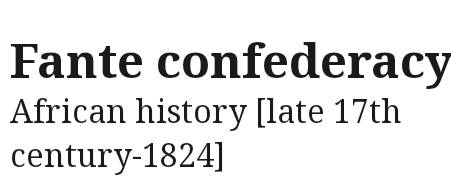Fante confederacy, Fante also spelled Fanti, historical group of states in what is now southern Ghana. It originated in the late 17th century when Fante people from overpopulated Mankessim, northeast of Cape Coast, settled vacant areas nearby. The resulting Fante kingdoms formed a confederacy headed by a high king (the brafo) and a high priest. It extended from the Pra River in the west to the Ga region (centred on Accra) in the east. To the south was the Atlantic coast, dotted with Dutch and British trading forts; to the north was the expanding Asante empire. The Fante, as intermediaries in Asante-European trade, debased Asante gold before selling it to the British and Dutch and controlled the flow of European firearms to the Asante.
- Date:
- c. 1651 - 1824
After decades of hostility, the Asante king Osei Bonsu conquered the Fante confederacy (1806–24) and gained direct access to the coast. After his death Asante power declined, and in 1831 the British administrator of Cape Coast, George Maclean, negotiated a treaty providing for Fante independence and Asante use of trade routes to the coast. Britain thereupon extended an informal protectorate over the south.
Resistance crystallized in the 1860s, after the British and the Dutch agreed to an exchange of forts (1867) without consulting any African rulers. The kings of the Fante kingdoms, Denkyera, and other southern states met at Mankessim early in 1868 to establish a self-governing state free of European domination. The new Fante Confederation had an executive council, a judiciary, an army, taxes, and a written constitution. Although short-lived, it was strong enough to discourage the Dutch, who abandoned the coast. The British successfully exploited rivalries among members of the confederation, and it disbanded in 1873. The next year Britain annexed the whole region south of the Asante empire as the Gold Coast crown colony.
Fante
Fante, also spelled Fanti, people of the southern coast of Ghana between Accra and Sekondi-Takoradi. They speak a dialect of Akan, a language of the Kwa branch of the Niger-Congo language family. Oral tradition states that the Fante migrated from Techiman (or Tekyiman), in what is now the northwestern Asante region, during the 17th century; they established several autonomous kingdoms that later joined in the Fante confederacy.
The Fante grow yams, cassava, cocoyams (taro), and plantain; cash crops include cocoa, palm oil, and timber. Fishing is also important. Rural Fante occupy compounds consisting of rooms around a walled courtyard. Households may consist of kin groups related through either male or female descent; it is common for a husband and wife to continue living in separate homes after marriage.

The Fante have a dual lineage system. Matrilineal descent determines membership in clans and their localized segments. Every lineage has a ceremonial stool in which reside important ancestral spirits, whose worship is a prominent feature of Fante religion. Patrilineal descent governs the inheritance of spiritual attributes and also determines membership in the asafo, a military organization. Allegiance to the asafo takes precedence over that to the matrilineage. The functions of the asafo are political (as the medium through which commoners express political sentiment and criticism of the chief), social (formerly as a cooperative labour unit and as guardian of the rights of its members), religious (in funerals and state ceremonies), and military (as the primary defensive unit of the state).
The head of each Fante state is the paramount chief, chosen from the royal lineage. Under him are divisional chiefs and subchiefs. The chiefs and representatives of the asafo function as advisers to the paramount chief. The Fante states never united under a single chief; each remained autonomous and formed alliances only in time of war.
Traditional Fante religion includes belief in a supreme creator god and in lesser deities who derive their power from him. At the end of the 20th century, however, most Fante were Christians.



No comments yet
Be the first to share your thoughts!